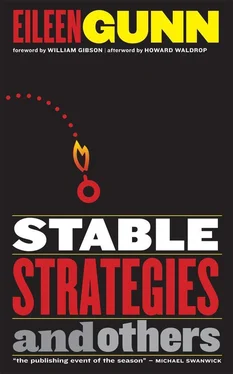Eileen Gunn
Stable Strategies and Others
Clawing our way into the 16th century
Introduction to the electronic edition, 2011
You could ask why it took so long: Michael Hart invented the first electronic book in 1971 and, forty years later, writers and publishers all over the world are still trying to master the form.
The answer, I think, lies in the fact that books are more than just words. What books look like and feel like is vitally important, and has been so since the time of clay tablets and papyrus scrolls. The printed books that we read now have evolved over hundreds of years, achieving a Cambrian diversity of form.
Ebooks are not yet so highly evolved, which, no doubt, is why many are a bit awkward-looking. We have an idea of how books are supposed to look and function, but we haven’t yet got the technology for easily implementing that idea in electronic form.
Which brings me to why it’s taken so long to create the digital version of Stable Strategies and Others . I’ve had a plan for implementing optimal ebook design that has taken some thirty years to effect. It is admirably simple: marry a superb book designer and get him to design my books, physical and virtual. So far, it’s working. Thank you, John D. Berry!
I owe Jacob Weisman of Tachyon Publications an enormous debt of gratitude for persuading me in 2003 that I had enough stories to put in a book, and for guiding me through the process. Thank you, Jacob!
After its print publication in 2004, Stable Strategies and Others was nominated for the Philip K. Dick and World Fantasy awards and shortlisted for the James Tiptree, Jr. award. The Japanese translation, 遺す言葉、その他の短篇, received the Sense of Gender award from the Japanese Association for Gender, Fantasy, and Science Fiction. The two previously unpublished stories in the collection, “Coming to Terms” and “Nirvana High” (the latter story written with Leslie What), also received recognition: “Coming to Terms” was given the Nebula Award for best short story, 2004, and “Nirvana High” was a Nebula nominee for novella the next year. Thank you, readers!
Eileen Gunn
Seattle, 2011
FOREWORD: She’s the Business
William Gibson
When I was a boy of thirteen or so, living in a small Virginia town and thinking of almost nothing but the science fiction I read, I learned that the genre was thought of as comprising a “ghetto.” Not by anyone in my immediate vicinity, but by the inhabitants of that supposed ghetto: the writers, editors, and (to some extent) readers of the stuff. Most people in my immediate vicinity, had they been asked, would have been unlikely to have described science fiction as a ghetto; “trash,” maybe, “balderdash,” but hardly a ghetto.
A couple of years later, I myself would have been reluctant to describe science fiction as a ghetto — mainly because I so badly wanted it to be not a ghetto but a bohemia. I had never seen a bohemia, but somehow I knew I wanted one. I had never seen a ghetto either, unless you counted the houses of the local blacks, which tended to be smaller and more dilapidated than the houses of whites, and to be clustered together somewhat at a distance.
I wanted a bohemia so much that I shortly left that town, and science fiction as well, in search of one. And found it (which proved easier than I had expected, given my timing).
Quite a long time later, nearly a decade, when for various peculiar reasons I found myself returning to science fiction, first as a reader and then as tyro writer, it still didn’t look much like a ghetto to me. Or, alas, much like a bohemia.
What it most resembled, it seemed to me, was a small town. A damned peculiar one, when you started looking around, but nonetheless subject to most of the complaints typical of sub-urban burgs: parochialism, provinciality, the literary equivalent of xenophobia. A worldview best characterized by this weird dysmorphia: that everything that wasn’t “the genre” (i.e. the whole of world literature other than science fiction) was “the mainstream.” This mainstream seemed generally to be regarded either as simply another (and generally inferior) genre, or the enemy, or (generally) both.
To add to the general weirdness, SFville was (and remains) a distributed entity, non-geographical.
For instance, though Old Glory flew from virtually every clapboard façade on Main Street, there was a British Quarter (one that many townspeople prided themselves on not yet having managed to visit). All of this had sprung up, long before the advent of email, via a marvelous construction some now refer to as the Paper Internet, and indeed there was not yet email when I first met Eileen Gunn.
Which was right at the very beginning of what would become my career, and what a very good and indeed utterly crucial person she was to meet. For starts, she wasn’t insane. For some reason, my earliest cohort in SFville numbered more than a few who were mad as sacks of rats. Eileen was a steadying influence, though never even remotely a dull one.
I have no idea when she’d arrived there, or how. I only know that when I stepped down from the bus, as it were, she was there to greet me and show me around, and was so evidently an urbane and delightfully witty person, so clearly not of that dysmorphic literary mindset, and yet she knew the place. Knew it in fractal detail, in every oddity of its culture, and seemed to appreciate it that way as well, exactly as she might some yurt-circle in Central Asia. While I, in my seething insecurity as desperate not-yet-writer, would periodically hiss at her, from between tensely raised shoulders, about hicks and one-horseness. At which, being that rarest of critters, the nerd with gloriously ample social skills, she would introduce me to yet another interesting resident (though these might range from the undeniably great Avram Davidson to the still-unsung creator of a species of slash fiction devoted exclusively to the passions of shaved Wookiees).
And she was a writer. Not merely a career-tourist but one with the sign blazoned full across her forehead, a lifer. She also, as Howard Waldrop tells us in his afterword, proved to be an even slower writer than Howard Waldrop. She became a sort of saint to me for this, as I was capable from the start of spending an entire twelve-hour stretch before the (then) typewriter, debating verb-tense choices in some minor clause. And not being able, finally, to decide. In addition, I suffer from a torch-bearing mob of inner voices, constantly shouting that whatever I’ve just written is as attractive as hairball macramé. Eileen had her own inner mob as well; excessive quality control issues, you might say.
The contents of this collection, having somehow conspired to make it past the iron-shod galoshes of Gunnian quality control, comprise the short-fiction oeuvre, so far, of someone whose thoroughly hands-on grasp of science fiction, and whose vision of what it could be, change things. The genre today is still a small town, albeit somewhat gentrified on the outskirts, with its core population numbering, I’d guess, not many more than a thousand. Among that thousand or so, Eileen Gunn’s innate sensibilities and cultural smarts have designated her a nodal entity, one of those human intersections where people and ideas meet, and out of which things change.
The exterior manifestations of this would be her careers as editor, teacher and Clarion West honcho, but the real mojo is working at some deeper level altogether. She is, quite simply, “the business.”
I enjoyed each of the pieces collected herein, but my favorites are “Fellow Americans,” a brilliant recursive fable in which Richard Nixon finds the career and the serenity that eluded him in our world, the sadly hilarious “Nirvana High” (with Leslie What) and “Green Fire,” which has four authors, a situation akin to having four heads and being a very good dancer.
Читать дальше












